- Hillary Clinton and Bernie Sanders engaged in a heated debate in New Hampshire Thursday night, offering sharp lines of contrast for voters ahead of Tuesday’s primary.
- Labels, smears, and other take-aways from the Democratic debate by The Times’ Noah Bierman
- Share via
Fact-checking the Democratic debate
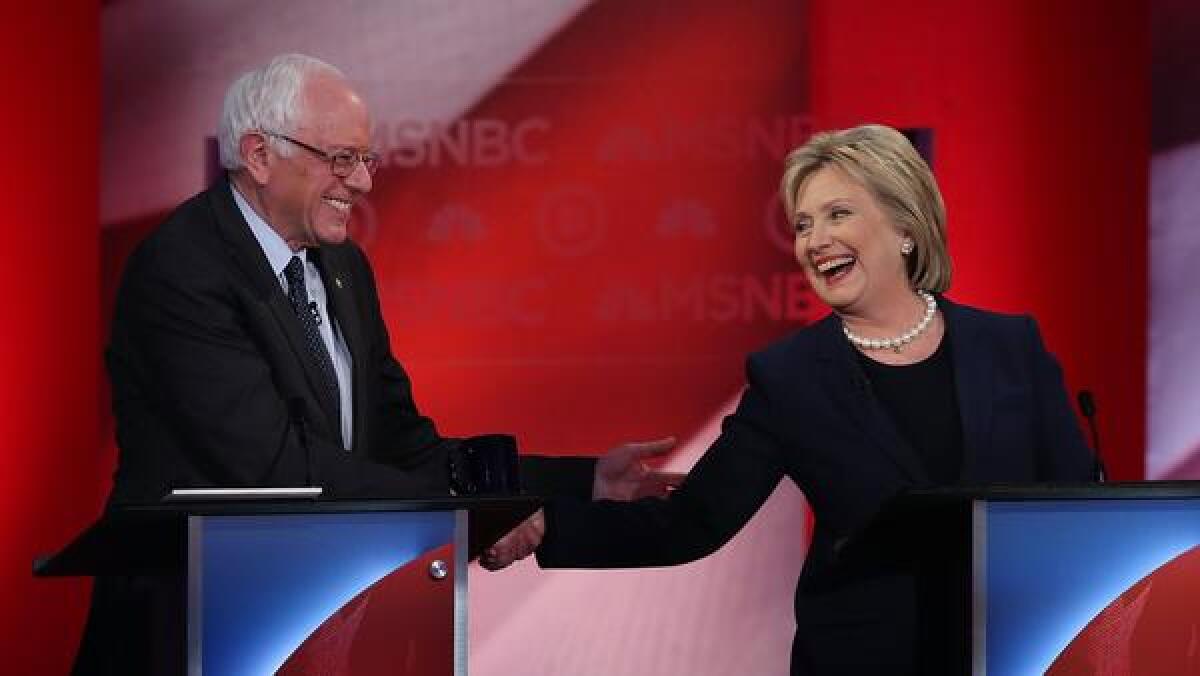
Hillary Clinton cast the financial industry as an adversary in her presidential campaign — despite the money that that industry has poured into her White House effort. Bernie Sanders once again mischaracterized the share of the wealth taken by the very richest Americans.
A look at some of the claims in their latest Democratic presidential debate.
- Share via
Labels, smears and other takeaways from the Democratic debate
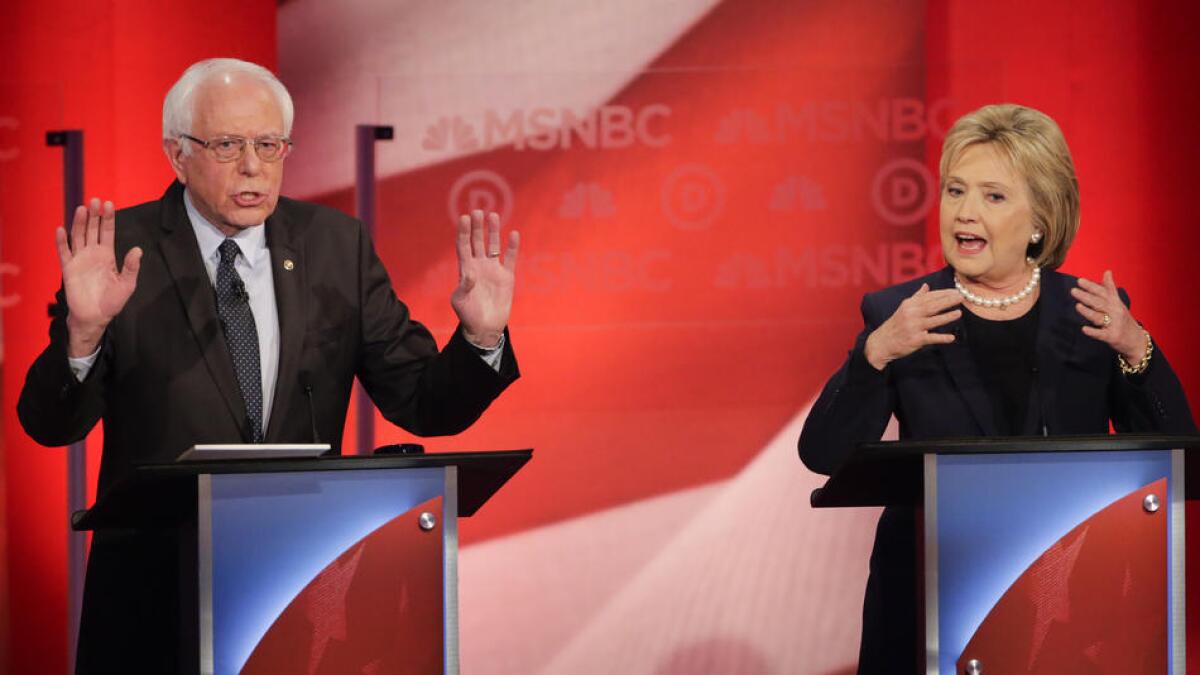
Hillary Clinton, the former secretary of State, and Bernie Sanders, the Vermont senator, held their first one-on-one debate Thursday, and the last one before the New Hampshire Democratic primary next week.
Sanders has a large lead in New Hampshire, but Clinton remains the national front-runner, leaving both sides eager to win over new voters.
Here are a few things we noticed:
- Share via
Wall Street exchange between Clinton and Sanders is biggest moment on Twitter
- Share via
Support for death penalty declining, but still a majority
Sen. Bernie Sanders’ declaration that he opposes the death penalty in all circumstances puts him in a growing, but still minority, part of the U.S. population.
The recent peak in support for capital punishment came in the mid-1990s, as the public reacted to the sharp increase in crime during the 1970s and 1980s. During Bill Clinton’s presidency, roughly 8 in 10 Americans supported the death penalty, according to the nonpartisan Pew Research Center.
Violent crime began to decline in the 1990s, and a few years later support for capital punishment began to fall as well. At this point, a bare majority, 56%, support the death penalty, compared with 38% who oppose it.
Most of that decline has come among Democrats. For the last decade, support for the death penalty has fallen below a majority of self-identified Democrats.
Currently, about 40% of Democrats share the view of Hillary Clinton that the death penalty is justified at least some of the time. But 56% share Sanders’ opposition to it in all cases.
- Share via
What climate change?
- Share via
Sanders, Clinton talk death penalty
- Share via
Which one is best to win a general election?
Two different candidates, Hillary Clinton and Bernie Sanders, see two different paths to winning a general election.
For Sanders, whose ability to win a general election has been questioned, it’s all about rousing the base with enthusiasm to turn out.
“Democrats win when there is a large voter turnout, when people are excited,” he said. “Our campaign, up to now, has shown that we can create an enormous amount of enthusiasm from working people, from young people, who will get involved in the political process.”
In many ways, the Sanders strategy is similar to that of Ted Cruz on the Republican side, whose campaign has studied the grass-roots strategy of President Obama’s former campaign manager, David Plouffe, in trying to expand the electorate.
Clinton, meanwhile, believes passion pales next to experience and the ability to withstand “the spotlight.”
“I’ve been vetted -- there’s hardly anything you don’t know about me,” she said, warning that the eventual nominee “will face the most withering onslaught.”
“It’s not so much electability,” she added. “It is who the American people believe can keep them safe, can get the economy moving again.”
- Share via
Hillary Clinton will leave N.H. and visit Flint, Mich.
- Share via
About those Iowa caucus results? Sanders supports a recount
Hillary Clinton won by the slightest of margins in Monday’s Iowa caucuses, and Bernie Sanders wants an audit of the results.
Sanders, who lost to Clinton 49.9% to 49.6%, said Thursday night he agrees with a Des Moines Register editorial calling for a complete audit of the results.
“At the end of of the day, no matter how it’s recounted it will break even,” Sanders said of the results. “I think we need improvements by which results are determined.”
Some rural precincts in the caucuses were decided by a coin flip.
So what did Clinton think about a recount?
“Whatever they decide to do, that’s fine,” she said grinning.
- Share via
Clinton on familiar ground
- Share via
More from Clinton text headquarters
- Share via
Clinton and Sanders vow to protect VA from privatization
- Share via
Foreign policy brings up votes from the past, but few differences today
With no easy answers in the war against Islamic State, the Democrats are left with few differences on how to fight terrorists abroad.
Neither Hillary Clinton nor Bernie Sanders want American boots on the ground in Iraq or Syria. They prefer to continue President Obama’s strategy of employing U.S. troops to advise coalitions of local fighters.
But the debate did offer the opportunity to revisit foreign policy history, with Sanders reiterating that he -- unlike Clinton -- voted in 2002 against the war in Iraq.
“A vote in 2002 is not a plan to defeat ISIS,” Clinton said.
Sanders said: “One of us voted the right way and one of us didn’t.”
- Share via
Sanders and Greenspan: The video
Sen. Bernie Sanders asked debate viewers to go to YouTube and type in “Greenspan Sanders.”
So we did.
We clicked on the top result, posted by Women for Bernie Sanders. It has 598,926 views.
It’s from 2003. If you want a sense of how long ago that is, look how young Rahm Emanuel looks.
- Share via
Clinton and Sanders battle over who is more progressive
Hillary Clinton delivered a spirited rebuke to the charge Bernie Sanders has been making on the campaign trail that she is not a genuine progressive.
“I have heard Sen. Sanders’ comments, and it’s really caused me to wonder who is left in the progressive wing of the Democratic Party,” Clinton said. “Under his definition, President Obama is not progressive because he took donations from Wall Street.”
She said Vice President Joe Biden wouldn’t qualify because he supported the Keystone XL pipeline, and the late Sen. Paul Wellstone of Minnesota, a revered liberal, also wouldn’t make the cut because he voted for the Defense of Marriage Act.
Then she launched into parts of Sanders’ record that could be seen as betrayals to progressivism.
“I don’t think it was particualrly progressive to vote against the Brady bill five times,” she said. “I don’t think it was progressive to vote to give gun makers and sellers immunity. I don’t think it was progressive to vote against Ted Kennedy’s immigration reform.”
Sanders wouldn’t yield.
“Instead of arguing about definitions, let’s talk about what we should do,” he said. “I am very proud to be the only candidate up here that does not have a super PAC, that is not raising enormous amounts of money from Wall Street or the special interests.”
Sanders was pushed by moderator Chuck Todd on whether he thinks President Obama is a progressive.
“Yeah, I do,” Sanders said. “I disagree with him on a number of issues … [but] I think he has done an excellent job.”
- Share via
About those endorsements
Hillary Clinton and Bernie Sanders just traded barbs on who has congressional endorsements.
We’ve been tracking where the California delegation stands in the race. Check it out.
- Share via
Bernie Sanders notes his long run as an independent - but can he lead Democrats?
Bernie Sanders has amassed strong support from liberals in his quest for the Democratic presidential nomination, but his past as an independent was placed at the forefront in Thursday night’s presidential debate.
When asked by a debate moderator how Sanders could lead Democrats when he has never been a member of the party until recently, he touted his time as an independent.
“It is true, it’s not to be denied I am the longest serving independent in the history of the United States Congress,” said the Vermont senator. “When I was in the House for 16 years I caucused with the Democrats; in the Senate for nine years I caucused with the Democrats.”
Sanders, who leads Hillary Clinton by double digits in New Hampshire ahead of the state’s primary Tuesday, added that he wants to see the party evolve if he’s elected.
“I want to see young people and working people come into the party in a way that does not exist now,” he said. “I want a 50-state strategy so that the Democratic Party is not a party of 25 states.”
- Share via
Clinton says enough with ‘smear’ attacks against her
Hillary Clinton has had enough of Bernie Sanders’ attacks on her ties to big money in politics and Wall Street.
“If you’ve got something to say, say it,” Clinton said, saying his “innuendo” and “insinuation” was not worthy of him. “It’s time to end this very artful smear that you and your campaign have been carrying out.”
Clinton said she has never shifted a vote or position because of campaign contributions.
“Enough is enough.”
Sanders shot back with a long list of interests -- from Wall Street to drug and oil companies -- who lobby for their interests.
“There is a reason why these people are putting huge amounts of money into our political system,” he said.
- Share via
As things get started, Team Clinton starts texting
Hillary Clinton’s campaign activated its text messaging just as Sen. Bernie Sanders gave his opening remarks.
“Hey there, its Jess from HFA!” read a note sent to phones of people who had opted in to texting. “Tonight on MSNBC is the last Democratic debate before the New Hampshire primary. Will you be tuning in to watch?”
Replying yes prompted the next message: “Awesome--tonight you can watch with me at HQ, Vice Chair of the campaign Huma Abedin backstage, or Senior Policy Advisor Maya Harris. Reply HQ, HUMA or MAYA”
We chose Abedin, given she is the best known. That prompted another text, presumably “from” Clinton’s close advisor.
“I’m Vice Chair of Hillary’s campaign. This debate is at the University of New Hampshire. We’re all set,” it read. Then it sent this photo of the podiums, taken before the debate began.
- Share via
Universal healthcare -- but how?
It didn’t take long for Hillary Clinton and Bernie Sanders to start debating healthcare during their first one-on-one debate. The issue has been a fault line during the Democratic primary.
Clinton said she wants to build on President Obama’s Affordable Care Act, and accused Sanders of trying to undo the progress that’s been made in pursuit of a single-payer program.
Sanders rejected the criticism, and said starting a debate over a new healthcare system run by the federal government wouldn’t require stopping the insurance that’s already in place.
- Share via
Clinton pushes Sanders: Who’s progressive?
I don’t think it was politically progressive to vote against the Brady bill.
— Hillary Clinton, referring to Sanders’ past opposition to gun control legislation
- Share via
A far different tone compared with last night’s town hall
- Share via
Bernie Sanders’ and Hillary Clinton’s opening statements
- Share via
Religious voters? Not so much in New Hampshire
New Hampshire has edged out Vermont as the least religious state in the U.S., Gallup said Thursday.
No surprise that Republican presidential candidates, after courting evangelicals in Iowa, will need to shift their message in the Granite State.
Religion plays more of a cameo role on the Democratic side, though Hillary Clinton and Bernie Sanders did discuss faith at CNN’s town hall this week.
“I get a Scripture lesson every morning from a minister that I have a really close personal relationship with,” said Clinton, a Methodist. “And, you know, it just gets me grounded.”
Sanders, who is Jewish but has said he has little involvement with organized religion, had a different take.
“My spirituality is that we are all in this together,” Sanders said. “When children are hungry, when veterans sleep out in the street, it affects me.”
Perhaps also not surprising, per Gallup, Mississippi “extended its eight-year streak as the most religious state, followed closely by neighboring Alabama.”
- Share via
On the ground at tonight’s Democratic debate
- Share via
Bernie Sanders counters Clinton claims about lack of accomplishments
In a possible preview of his approach in the first one-on-one debate with Hillary Clinton on Thursday, Bernie Sanders challenged his rival’s assertion that he lacked accomplishments to support his claims of being a progressive champion.
In the only public event by either candidate before a nationally-televised debate, Sanders listed a series of difficult votes he has cast throughout his career on issues such as trade, gay rights and both the Iraq war and the Gulf War more than a decade earlier.
“Sometimes it is easy to apologize for a bad vote 15 or 20 years later when the tide has changed,” Sanders said. “It is a lot harder to stand up, even though you were outnumbered, and cast the right vote. And that is what leadership is about. Not having to apologize, standing up and fighting for what is right.”
He also talked about veterans reform legislation he helped pass as the committee chairman in the Senate, and other legislative accomplishments.
The Vermont senator otherwise hewed closely to his call for a “political revolution” and highlighted his grassroots support.
“To paraphrase Abraham Lincoln at Gettysburg, this campaign is of the people, by the people and for the people, and that is why we are going to win,” he said.
New polls released Thursday show Sanders maintaining his comfortable advantage. He said a victory in New Hampshire would change the nature of the Democratic race.
“If New Hampshire supports not just Bernie Sanders, but a political revolution, we will send a message to the rest of this country that status quo establishment politics and status quo economics is no longer acceptable,” he said.
- Share via
Carly Fiorina is left out of final pre-New Hampshire debate
With a narrower Republican presidential field, there’s no longer a need for any “undercard” debates. And yet ABC News announced Thursday that one of the remaining hopefuls will still be left off the stage in the final debate before Tuesday’s New Hampshire primary: Carly Fiorina.
The announcement was expected, given the previously announced criteria to qualify for what is the eighth debate of the nomination season: finish third or better in Iowa; place among the top six candidates in an average of New Hampshire polls; or place among the top six candidates in an average of national public polls.
But prominent Republicans -- including the last presidential nominee and New Hampshire’s leading elected Republican -- protested the exclusion, with some saying the field’s lone woman needed to have a spot.
And, of course, Fiorina herself objected.
“I’m a more viable candidate than some of the guys on that stage,” she said on MSNBC on Thursday afternoon, citing her performance in Iowa (finishing ahead of John Kasich and Chris Christie), fundraising and her campaign organization across the country. “There is room for eight candidates on the stage.”
One debate organizer defended the decision, calling the qualifying criteria “more inclusive than in past cycles, and very fair at this point in the political cycle, when people have actually voted.”
But the Republican National Committee and ABC News are feeling pressure to change course. From Mitt Romney, the 2012 New Hampshire primary winner and ultimately the nominee:
Sen. Kelly Ayotte, the top elected Republican in the state, said Fiorina has worked hard to earn support from New Hampshire voters.
“ABC News’ decision to exclude her from Saturday’s debate on the eve of our primary, while she is outperforming one of the other debate participants in New Hampshire polls, undermines our role in the primary process,” she said.
- Share via
Poll: Rubio second behind Trump in New Hampshire
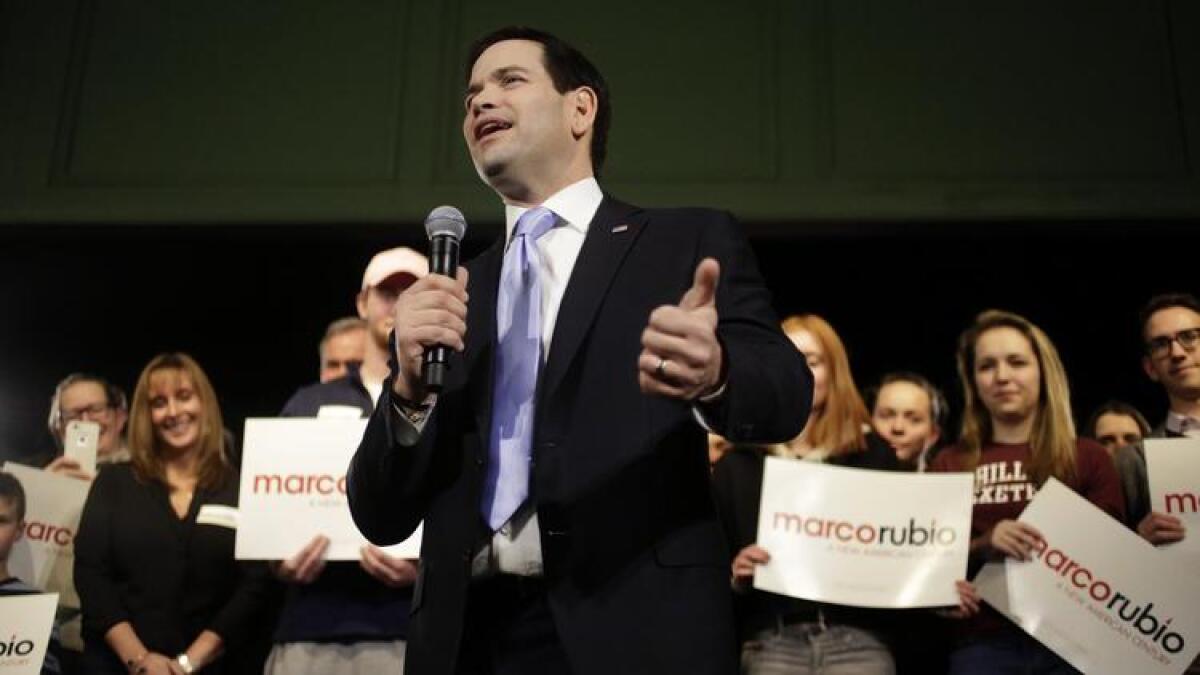
Marco Rubio popped into second place behind Donald Trump among likely Republican primary voters in New Hampshire, according to a new CNN/WMUR poll Thursday.
Trump maintained a commanding lead, at 29%, but the Florida senator enjoyed a boost from his strong finish this week in Iowa, pushing past rivals to 18%.
The survey taken in the days since the Iowa caucuses put Texas Sen. Ted Cruz at 13%, Ohio Gov. John Kasich at 12% and former Florida Gov. Jeb Bush at 10%. New Jersey Gov. Chris Christie trailed at 4%.
More voters have begun making up their minds since Iowa, but about one in three — 34% — are still deciding, according to the survey.
The inevitability of Trump’s front-runner status took a hit — 61% now think he will win the primary, a dip from 70% before Iowa.
- Share via
Can Hillary Clinton attract young voters?
Read MoreIt’s one of the starker facts to emerge from the Iowa caucus: Young people are not on Hillary Clinton’s side.
On Thursday, Clinton acknowledged that she was impressed by Bernie Sanders’ draw.
“I personally am thrilled at the number of people – particularly young people – who are coming to support [Sanders’] campaign. I hope that I will be able to earn their support. They may not support me now, but I support them.”
In the recent Iowa caucus, among 17- to 29-year-olds, a whopping 84% caucused for Bernie Sanders.
Clinton picked up just 14%, according to entrance polling conducted for a consortium of news outlets.
The generational divide narrowed a tad among those aged 30 to 44, with 58% going for Sanders and 37% for Clinton.
As The Times’ Evan Halper explained, many theories explain the age gap: Younger voters can be more idealistic, appreciating the 74-year-old Sanders’ vision to the former secretary of State’s pragmatism.
In Iowa, voters didn’t flip to Clinton until age 45, when 58% of 45- to 64-year-olds preferred her, compared with 35% for Sanders.
Among those 65 and older, 69% went for Clinton, and 26% for Sanders.
- Share via
Big age gap in sources of campaign news
If you find it hard to escape news of the election, you’re not alone. A recent report from Pew Research Center found that nine in 10 Americans report that they are learning about the election in a given week.
That’s a high level, which reinforces other signs that people are paying attention to the election, such as the big TV audiences for debates and the number contributing to candidates.
Those paying attention include young Americans, ages 18-29, who do not always follow politics. More than eight in10 millennials said they were learning about the election.
But there is a vast difference in where different age groups get their news of the campaign. Among millennials, the largest group -- 35% -- is getting election news from social media. Only 12% are going to cable television news for that information.
By contrast, in the 30-49 tier, social media use falls to 15%, with cable TV news leading the way at 21%. As the age range goes up, so too does the use of cable news, while the the use of social media falls.
About one in five people age 49 and younger reported getting information from news websites or apps -- the second-biggest source for both the 18-29 and 30-49 age groups. For people 50 and older, however, use of news websites fell sharply, to one in 10 ages 60-64 and one in 20 of those 65 and older.
While use of news websites is high, particularly among younger people, the use of printed editions of newspapers as a source of campaign information has continued to drop. Overall, only about 5% reported print as a source.
Pew found that when it came to finding election news on social media, Facebook led the way at 37%. And Snapchat, which was once thought as a possible make or break for the election, trails behind Reddit, Google Plus and Instagram at 2%. Twitter was cited by 9%.
- Share via
New polls: Bernie Sanders way ahead in New Hampshire
Since they arrived in New Hampshire this week. Hillary Clinton and Sen. Bernie Sanders have been arguing over who is the underdog in the race.
Each candidate is trying to own the title in the predictable game of setting expectations low so victory in Tuesday’s primary will seem that much bigger a deal -- and defeat that much less embarrassing
Two polls released Thursday, however, suggest that there is one clear underdog at this point -- Clinton.
She is trailing in New Hampshire by 20 points according to a NBC News/Wall Street Journal/Marist poll, which was conducted since the candidates arrived in the state following the Iowa caucuses Monday.
Sanders is supported by 58% of likely voters in the Democratic primary, while Clinton has the support of 38%, the poll found. That’s about where the poll stood last week, before the Iowa results.
The poll shows Sanders beating Clinton across all groups, even demographics in which Clinton has traditionally been strong in this state, such as women and registered Democrats (independents can also vote in the primary).
A poll by American Research Group shows a similar result, with Sanders winning 54% to 38%.
- Share via
Clinton says Sanders’ ‘numbers just don’t add up’
Hillary Clinton says she’s the candidate who “gets things done,” but Bernie Sanders is no legislative slouch.
At Thursday’s debate, Clinton suggested again that Sen. Bernie Sanders’ proposals, while well-intended, are not realistic or achievable.
“The numbers just don’t add up,’’ Clinton said of Sanders’ proposals.
Here’s a look at what Sanders has accomplished during his 25 years in Congress.
Sanders tucked a $12-billion provision into the Affordable Care Act to expand community health centers, a crucial part of the healthcare delivery system, particularly for rural populations.
More recently, as chairman of the Veterans Affairs Committee, he oversaw a bipartisan accord to reduce the VA backlog by allowing vets see private doctors. President Obama signed the 2014 measure into law.
His first bill to become law established the national program of cancer registries, which funds states to collect data on incidents and locations of cancers.
- Share via
Is Hillary Clinton progressive enough?
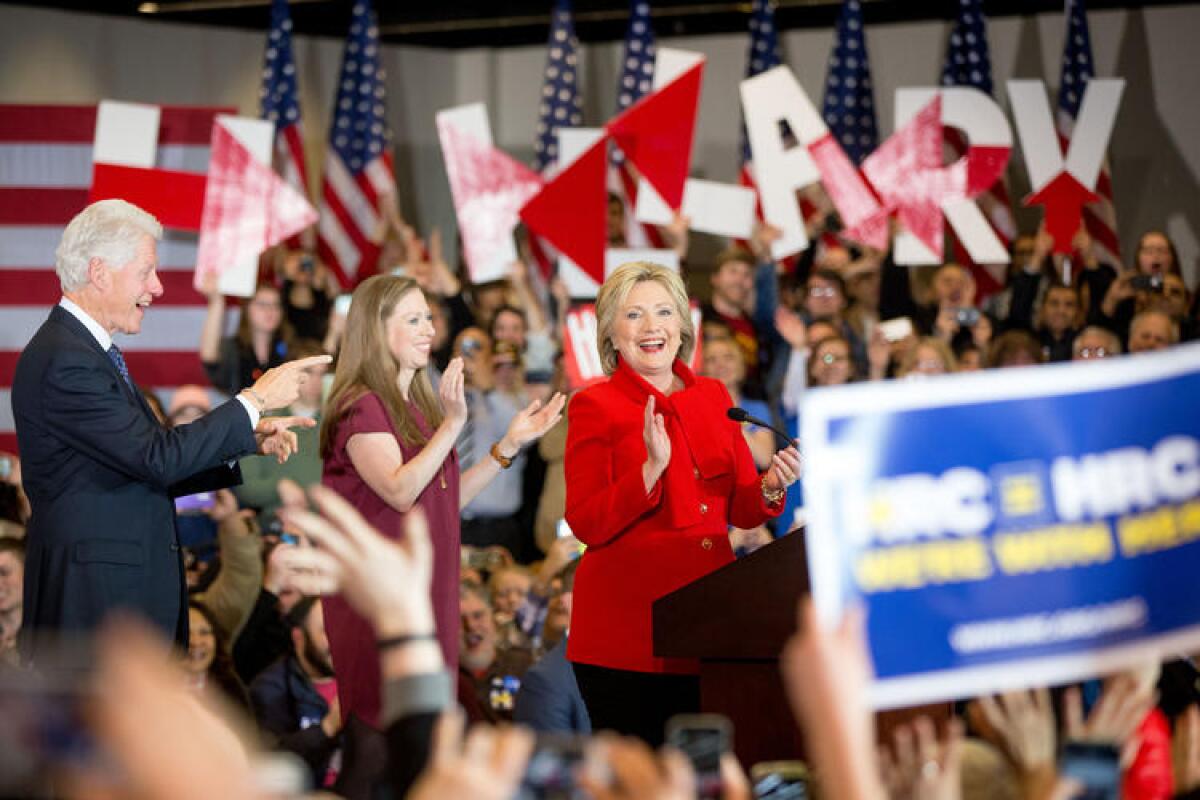
It’s a question that continues to dog the former secretary of State, and it probably won’t take very long to come up during tonight’s debate. Here’s a quick look at both sides’ views.
YES, SHE IS!
1. Clinton began her career as an attorney and board member with the Children’s Defense Fund, advocating for children and the disabled, and she used her job as secretary of State to push for women’s rights around the world. It’s part of a long biography that formed her worldview as a “progressive who gets things done,” in her words.
2. Clinton has won praise from former Rep. Barney Frank and Sens. Sherrod Brown and Elizabeth Warren for her plan to regulate Wall Street. As first lady in the 1990s, she fought, though unsuccessfully, to overhaul the nation’s healthcare system long before Obamacare.
3. She said she’d go even further than President Obama in helping certain immigrants in the country illegally.
NO, SHE’S NOT!
1. Clinton has embraced the label “moderate” and assailed some liberal political ideals, such as Sen. Bernie Sanders’ push for free public college. “You know, I get accused of being kind of moderate and center,” Clinton said during a speech in September. “I plead guilty.”
2. Clinton has collected millions of dollars in speaking fees, including six-figure payments from Goldman Sachs and other corporate interests. Wall Street has been a major funder for her and her husband’s campaigns for decades. Unlike Sanders and Warren, she does not support reviving the Glass-Steagall Act, the 1933 law that prevented federally insured banks from selling securities.
3. She’s hawkish. As a senator she voted for the war in Iraq, and as secretary of State she supported intervention in Libya and greater involvement in Syria.
- Share via
Trump hammers hard on illegal immigration at New Hampshire town hall
Donald Trump’s pledge to run a more “understated” campaign for president came to an abrupt end Thursday in a gusher of heated rhetoric on illegal immigration at a town hall in New Hampshire.
The Republican billionaire from New York raised his voice and salted his remarks with profanity as he responded to questions in the packed 19th century town hall of this quaint New England community.
A woman from Southern California was booed after telling Trump that immigrants in the country illegally “do work that no one else wants to do, and for a lot less.”
“Who told you to be here, Bernie?” Trump asked amid a wave of jeers, referring to Democratic presidential hopeful Sen. Bernie Sanders of Vermont. “This is a Bernie plant.”
Another woman yelled that immigrants were the backbone of the country. “Are illegal immigrants the backbone of our country? I don’t think so, darling,” Trump responded.
“People that came to this country legally, and they worked their ass off, and they made the country great -- that’s the backbone,” Trump said to a burst of cheers.
After losing the Iowa caucuses on Monday, Trump told NBC he would be more understated and statesman-like.
But he did not shy from vulgarity at the Exeter town hall. Trump told the crowd that thousands of veterans die while waiting for medical care, saying “no politician’s going to solve it.”
“I was going to say they’re full of ..., but I won’t say that,” Trump said to laughter. “No it’s true. ... I won’t say it, but they are. But I won’t say that, because it’s too controversial, let me tell you, and of course it’s not politically correct.”
“When I talk about anchor babies, right?” he continued. “That’s where somebody comes over, walks across a line, has a baby, now we take care of the baby for the next 85 years, OK? ... You try having an anchor baby in Canada.”
He lowered his voice, adding, “Well, there’s one anchor baby in Canada.”
The crowd groaned and laughed at his mocking of rival Ted Cruz, the Texas senator whose Canadian birth to an American mother, according to Trump, might disqualify him from the presidency.
“Try having an anchor baby in Mexico,” Trump said. “You know what they’ll do to you? They’ll laugh at you. … We are the stupidly run country. We have leaders that are incompetent, and we’re going to end it.”
With the New Hampshire primary just five days away, Trump largely avoided talking about his rivals. But he castigated Jeb Bush, who he said supported Common Core educational standards and spent too much on his campaign. He also lamented “sanctuary city” protections for immigrants in the country illegally when Bush was governor of Florida.
- Share via
Kasich tries to stay upbeat on campaign trail
Even as Republicans sharpen their knives for next Tuesday’s New Hampshire primary, John Kasich tried to stay out of the fray Thursday, decrying the negative campaigning dominating the race.
“How are they supposed to lead the country if they can’t sell themselves?” the Ohio governor said during a campaign appearance in Pelham.
Kasich said that “they can’t build mailboxes big enough” to fit all the negative advertising thrown against him.
He portrayed himself as the GOP candidate with the most experience. But he demurred when asked if he should be drawing stronger contrasts with Marco Rubio, the first-term senator from Florida who is seeking to turn his third-place finish in the Iowa caucuses into a stronger showing here.
A relative moderate in the race, Kasich has staked his White House bid on doing well enough in New Hampshire to move on to other states.
He acknowledged earlier this week that a major loss here, following his miserable showing in Iowa, probably will doom his chances.
He expressed confidence about his operation here.
“You win football games in the trenches,” Kasich said. “We absolutely have the best ground game.”
- Share via
Jeb Bush, killing them softly
Jeb Bush has spent a lifetime in Republican politics, in government, in political office, carving a deep furrow along the campaign trail.
And so Florida’s ex-governor has mastered one of the tropes of the trade, which might be called damning with calculated praise. Put another way, some of his best friends are people he’d really like to clobber.
Campaigning Thursday morning in Pittsfield, at a company that manufactures clothing for firefighters, Bush trained his sights on Marco Rubio, Ted Cruz and, indirectly, Donald Trump, the top three finishers in the Feb. 1 Iowa caucuses.
Once considered the front-runner, Bush is making something of a last stand in Tuesday’s New Hampshire primary after a miserable showing in Iowa.
“Marco Rubio is a buddy of mine,” Bush said of the 44-year-old Florida senator, whom he once mentored, as a pair of mannequins outfitted in campaign regalia stood silent witness.
“He’s gifted beyond belief,” Bush went on. “He’s a great speaker. He’s been a politician since, man, I mean I think he was elected when he was 26. And he’s served well. But has he ever done anything in his life that would make you believe he can make a tough decision, that he could forge consensus, that he could build around a common purpose?”
Cruz, he said of the Texas senator, “is a gifted politician. He can turn a phrase ... like nobody’s business. He’s been doing it since he was on the debate team at Princeton and Harvard. He’s a smart guy, and he is a good, solid conservative. But what has he done in his life that would suggest that he can make a tough decision on behalf of people?”
Bush pledged that as president he would “accept personal responsibility to fix things. And if it’s on my watch, I won’t blame anybody else…”
He pledged to be “a steady hand as commander in chief, that I won’t be saying outrageous stuff” — looking at you, Donald! — “to try to push someone down to make myself look better. That we need a steady hand to deal with the threats that exist around the world.”
Any kind thoughts about Bush’s other rivals for New Hampshire’s establishment conservative vote — Govs. Chris Christie of New Jersey and John Kasich of Ohio, went unspoken.
- Share via
Cruz delights in Jimmy Carter’s ‘endorsement’ of Trump
Ted Cruz says he won’t get into the gutter by trading personal insults with Donald Trump, as the New York billionaire accuses him of stealing the caucuses in Iowa, of having a nasty temperament and all manner of other things.
But as the race heats up before New Hampshire’s first-in-the-nation primary next Tuesday, Cruz will happily prod Trump to keep coming after him.
His latest tool for doing so: former President Jimmy Carter, a liberal Democrat who said this week he would prefer Trump over Cruz as president because Trump is “malleable” and thus open to making deals with Democrats.
“Jimmy Carter endorsed Donald Trump,” Cruz said at a town hall Thursday hosted by a Toyota dealership in Portsmouth.
“I am not making that up .… He said because Trump is malleable, doesn’t have any core beliefs, he will work with us and do what we want. But Cruz? That guy believes this stuff!”
The paraphrase wasn’t that far off what Carter actually said, though the former president was far less kind to Cruz.
Cruz had some other things to say about Trump, whom he accused of throwing a “Trumpertantrum” after coming in second, behind Cruz, in Iowa.
“Donald Trump is very rattled right now,” Cruz said. “He told the entire world he was going to win Iowa, then he didn’t win. His reaction is he got very angry.”
Cruz then predicted Trump’s next move, recalling how Trump famously questioned whether Iowa voters were stupid when polls last fall showed rival Ben Carson gaining on Trump in the state.
“I assume the next question he is going to ask is how stupid can the people of New Hampshire be,” Cruz said.
- Share via
Insert your combustion/inflammatory metaphor here
- Share via
Campaign 2016: Not just for the rich and famous
- Share via
Elizabeth Warren defends Bernie Sanders against Goldman Sachs
Sen. Elizabeth Warren (D-Mass.) has not endorsed a candidate for the Democratic presidential nomination, but she does show support for some of Bernie Sanders’ ideas.
Goldman Sachs CEO Lloyd Blankfein called out Sanders in an interview with CNBC for threatening Wall Street and small and large businesses.
But Warren, a liberal icon who supports more oversight of big business and Wall Street, said Wednesday that she found Blankfein’s criticism unfounded.
“When Blankfein says that criticizing those who break the rules is dangerous to the economy, then he’s just repeating another variation of ‘too big to fail,’ ‘too big to jail,’ ‘too big even to prosecute,’” Warren told the International Business Times.
She said Blankfein supports prosecuting small-business owners for banking misconduct, but not the chiefs of large financial corporations.
“Don’t criticize companies like Goldman Sachs and their very, very important CEO,” she said, as she characterized Blankfein’s position.
Blankfein told CNBC earlier that Sanders’ rhetoric against companies such as Goldman Sachs suggests that legislators shouldn’t allow businesses to adjust to unique financial situations.
He argued that some flexibility helps the economy grow and move forward.
The senator from Vermont slammed the Goldman Sachs leader last month for continuing to make a lot of money despite “destroying the economy.”
Goldman Sachs employees have donated to Sanders’ Democratic rival Hillary Clinton. He has repeatedly attacked Clinton for her ties to Wall Street.
On the campaign trail, Sanders promises to break up big banks and reform Wall Street. But, Blankfein said in the latest tiff, those threats could undermine the economy,
“It has the potential to be a dangerous moment, not just for Wall Street, not just for the people who are particularly targeted, but for anyone who is a little bit out of line,” he said.
- Share via
Far from the Mexican border, immigration still drives the New Hampshire debate
New Hampshire is 94% white and about as far as possible from the nation’s southern border. Nonetheless, illegal immigration has emerged as a virulent issue in this state’s presidential primary.
Donald Trump is savaging Texas Sen. Ted Cruz on the state’s airwaves, contending that Cruz favors legal status for those in the country without proper papers. An independent group backing Florida Sen. Marco Rubio is running ads accusing Cruz of flip-flopping on the subject. Cruz and Rubio both cast their immigration plans as uncompromising while dancing around the question of how they would handle the nearly 11 million people in the country illegally.
The involvement of the Republican Party’s top three candidates is driven by Trump’s vehemence, Cruz’s and Rubio’s actions as U.S. senators, and the concern of a small but persistent percentage of the state’s voters.
But in this contest, the issue of immigration is also a means of demonstrating generalized toughness at a time when GOP voters, many of them fearful of terrorism, economic uncertainty and cultural shifts, are demanding a forceful presence at the top of the ticket.
- Share via
Latinos voted in record numbers in Iowa, poll indicates
The nation’s growing Latino electorate long has been described as a “sleeping giant,” with lots of potential to impact elections, but a bad track record of turning out to vote.
In Iowa this week, it appears the giant woke up.
As part of a record turnout of voters in Iowa’s presidential caucuses Monday, more Latinos voted than ever before.
- Share via
Heading into 5th debate, Bernie Sanders is on the offensive
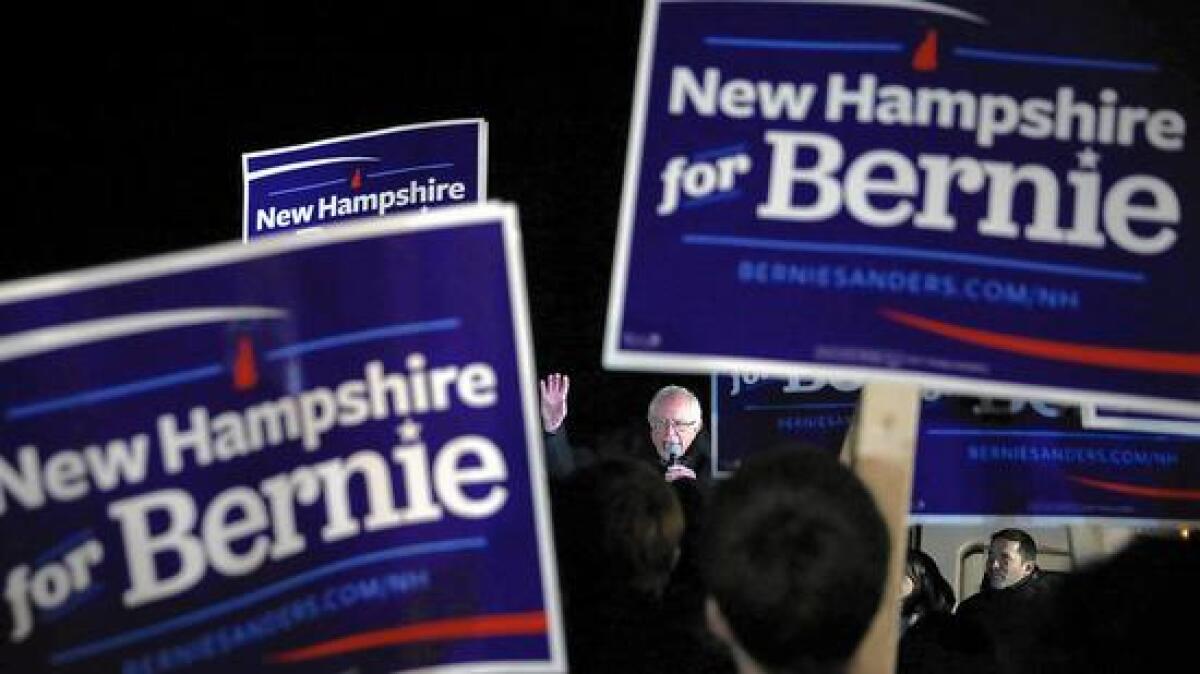
As Sen. Bernie Sanders takes the stage tonight in New Hampshire, he’s playing a role that is new to his unlikely campaign: that of the juggernaut.
The Times’ Evan Halper and Michael A. Memoli report from New Hampshire that following his virtual tie in the Iowa caucuses, Sanders’ campaign feels as if it is holding the cards. And they plan to play them.
Here’s their story:
- Share via
As Clinton reaches for the glass ceiling, young feminists shrug
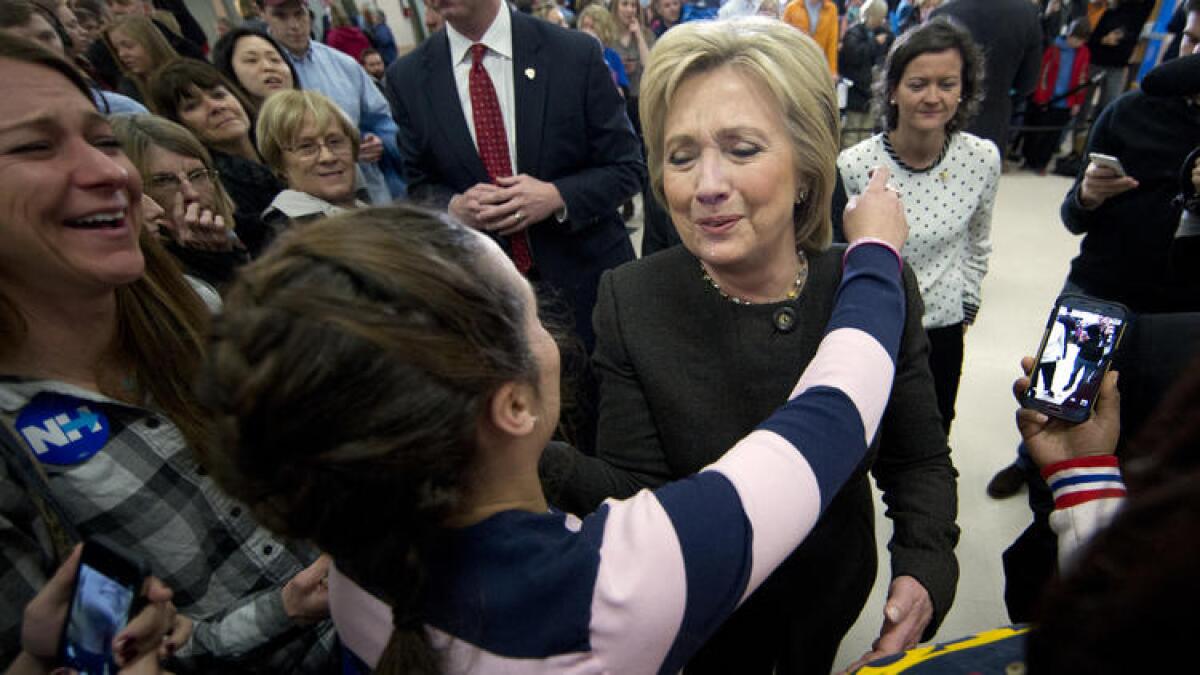
It was not so long ago that Hillary Clinton was relishing her status as an icon among young feminists, who cheered her resilience to political attack, her use of her stardom to advance the cause of women worldwide, even her trademark pantsuits.
But now, when Clinton needs that support the most, much of her backing among women of the millennial generation has vanished.
Locked in an increasingly tense battle for the Democratic nomination, Clinton has aggressively reached out to young women with the promise of breaking a glass ceiling that the women’s movement has worked for decades to shatter. The newest generation of feminists is responding with a shrug.
- Share via
Marco Rubio’s new slogan: ‘Win in November’
Sen. Marco Rubio is pushing a new motto heading into New Hampshire’s primary on Tuesday — “Win in November.”
The Florida lawmaker finished a strong third in the Iowa caucuses and now is battling Texas Sen.Ted Cruz and businessman Donald Trump in a narrowed three-man top tier in the race for the Republican nomination.
Rubio’s campaign strategy hopes to focus voters beyond the fight for the GOP crown. He wants voters to see him as the candidate who can beat the Democratic competition.
Sen. Tim Scott (R-S.C.) endorsed Rubio on Feb. 2 and appeared in the Florida senator’s latest TV ad touting his ability to win the White House for the conservative party.
“Marco Rubio understands that here in America it’s not about where you start, it’s about where you’re going,” Scott says in the video.
Rubio can unite the divided Republican Party for victory, he says.
In Iowa, Cruz and Trump won the support of certain GOP groups — evangelicals, tea party adherents, those with anti-establishment leanings. Rubio’s new slogan and claim he can heal the party is pitched to the voters who were his strongest backers: Republicans who fear that interparty disputes will keep them from the presidency for at least an additional four years.
- Share via
Clinton boasts of her record under Obama
Hillary Clinton again noted that after running hard against then-Sen. Obama in 2008, he turned to her to become his secretary of State.
Both Clinton and Sanders have worked to reach out of Obama supporters.
Obama recently characterized the Democratic primary as a choice between Hillary Clinton, a “good, smart, tough” person, and Sen. Bernie Sanders, a “bright, shiny” new alternative.
Though he has not formally endorsed either candidate, Obama’s willingness to step personally into 2016 politics during a recent interview revealed how deeply he believes Clinton is the candidate best suited to build on his achievements.
But after a White House meeting last week, Sanders said he did not think the president was trying to tilt the scales.
- Share via
How serious is Clinton’s email problem?
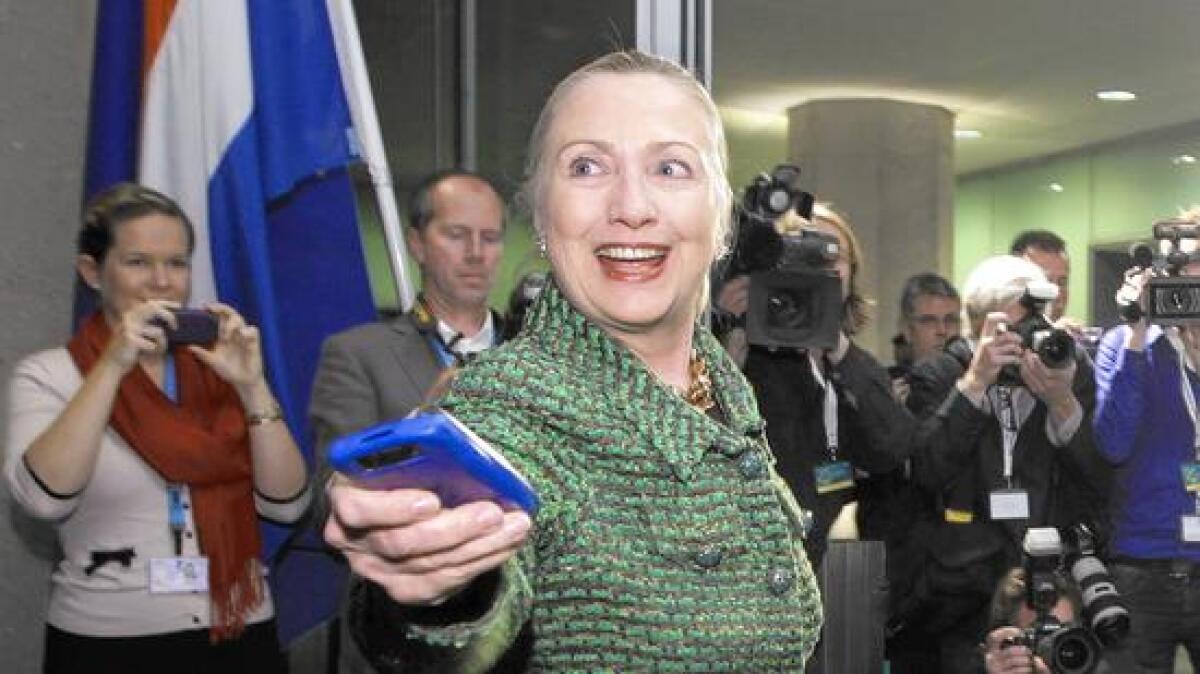
Hillary Clinton’s use of a private email account when she served as secretary of State and recent disclosures that some of the material that passed through her server was later classified as “top secret” continue to dog her campaign.
With Republicans repeatedly saying the scandal should disqualify her from the White House and even result in her prosecution, it’s little surprise the issue came up Thursday.
She dismissed the scandal as a “political ploy” and “an absurdity.”
She also noted that earlier in the day NBC reported that classified information was also sent to the personal email accounts of former Secretary of State Colin Powell and the senior staff of former Secretary of State Condoleezza Rice.
The Times’ David Savage looked into Clinton’s legal vulnerability and found that criminal charges may not be in the cards. Check out his story here:
- Share via
Why passion for Bernie Sanders runs deep
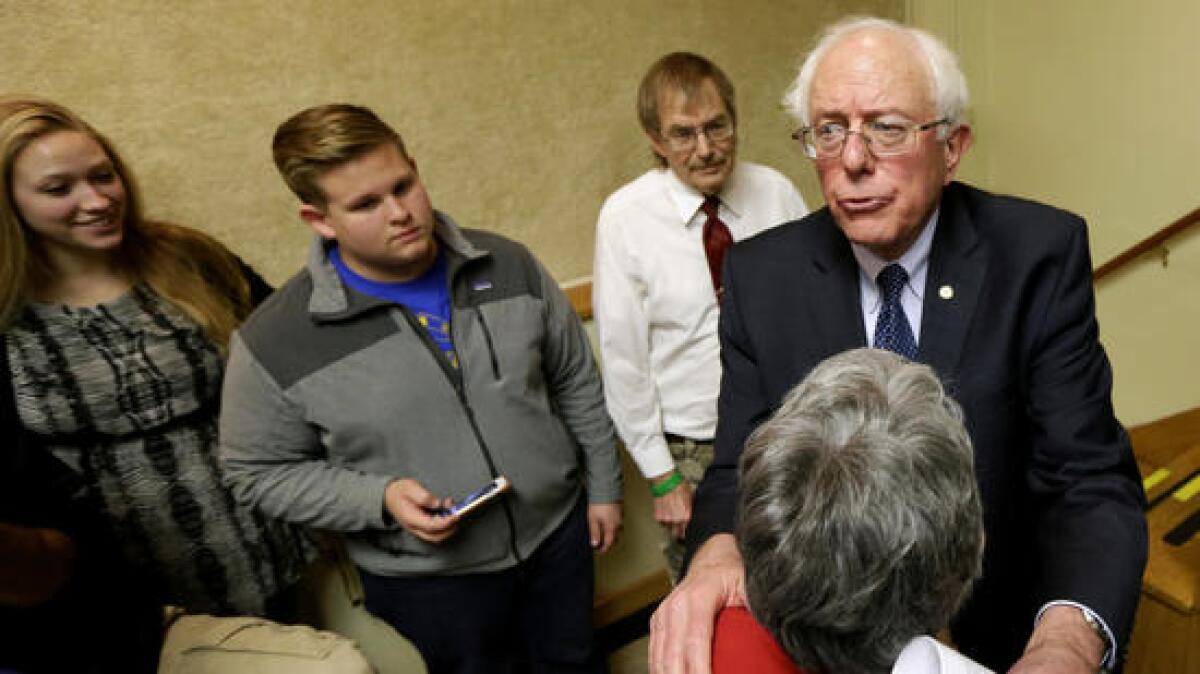
Months before Vermont Sen. Bernie Sanders entered the presidential race, The Times’ Mark Z. Barabak accompanied him to understand his passion for fighting for the working class.
- Share via
As Clinton courts progressives, centrists see her as their only option
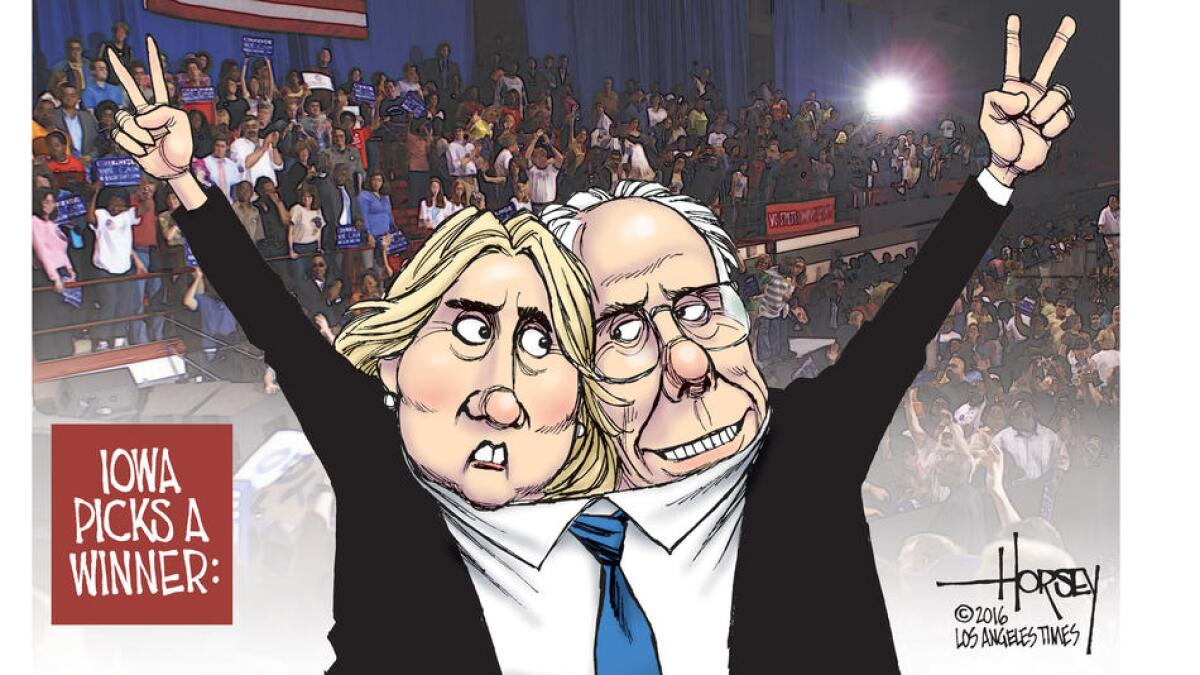
Sen. Bernie Sanders’ candidacy has pushed Hillary Clinton away from the middle-of-the-road politics that her husband followed to win eight years in the White House.
The Times’ David Horsey explains why Clinton is likely to drift back to the center.